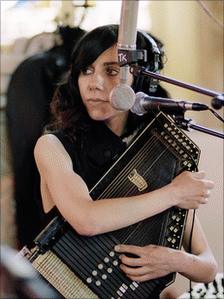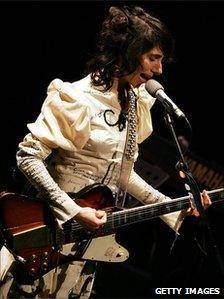PJ Harvey puts war hell on record
- Published

Let England Shake is PJ Harvey's eighth studio album
On her latest album, singer PJ Harvey has depicted the horrors of war in brutal detail, motivated by the conflicts in Iraq and Afghanistan.
There are arms and legs in the trees. There is flesh quivering in the heat. There are deformed and orphaned children. Heavy stones are falling. Death is everywhere.
Welcome to the world created by PJ Harvey on her new album Let England Shake, from which these lines come. Enter at your peril.
Over 20 years as one of Britain's most single-minded and artistically driven music-makers, Harvey has always ventured where other musicians fear to tread.
But whereas inner anguish has previously fuelled her personal, visceral songs, for this record she has decided to tell harrowing stories from the front lines.
Oppressed civilians
The songs on Let England Shake create vivid snapshots of conflicts from Gallipoli to Helmand and convey her pretty damning view of the societies that allowed them to happen.
Determined to reflect the human toll of modern combat, Harvey spent two-and-a-half years researching the subject and interviewing survivors, just as a novelist or scriptwriter might.
She imagined herself as a wartime "song correspondent" and her dispatches tell of service personnel who witness terrible things and oppressed civilians who see their countries torn apart.
Asked which conflicts provoked her to write the album, Harvey replies: "All current conflicts I would say.
"But of course the most recent conflicts, particularly the ones we are involved in - Iraq and Afghanistan - but all conflicts really.
"It's the result of just living in the world that we're all living in today. That's what's brought about the need for me to try and write an album like this."
Mercury Prize
Harvey has always been "very politically engaged" but was previously afraid of sounding self-righteous or preachy when tackling global issues, she says.

PJ Harvey will take the album on tour from February
"Very gradually over the last four or five years I began to feel that my writing had got to the stage where I might be able to try and address such things now within song.
"So that was coupled with a greater sense of urgency and need to want to try to wrap words round our contemporary situations."
The urgency, she says, comes from "the world that we're living in", adding: "I think a lot of people are feeling that at the moment."
The songs are rarely overtly political but are set against a backdrop of Western societies whose faraway failures have had catastrophic consequences.
Harvey, who won the Mercury Prize in 2001, is vague about her own political views, making deliberately diplomatic statements when asked for her thoughts about global affairs.
"I'm not wanting to talk about my personal opinions because I want the work to stand up for itself and be taken in any way that the listener hears it," she says.
She will say it is a writer's job to "absorb the world around you" and "absorb what's in the air".
"I've always felt very interested in what's going on in the world and our country and everywhere. It did feel timely. It felt timely now to write this piece."
The first single, The Words That Maketh Murder, is a serviceman's tale of seeing how "soldiers fell like lumps of meat, blown and shot out beyond belief, arms and legs were in the trees".
First-hand accounts
This Glorious Land depicts a country that is ploughed not by iron ploughs but "by tanks and feet marching", with the "glorious fruit of our land" being deformed and orphaned children.
The song is punctuated by a hunting bugle and a haunting refrain of "Oh America, oh England".
Harvey, who recorded the album in a church in her home town of Bridport, Dorset, chose to tell her stories through the eyes of ordinary soldiers and civilians because she could only speak as "a human being who feels emotions and to empathise", she says.
During her research, she spoke to people who had various different roles in Iraq and Afghanistan, she says, as well as learning about other historical conflicts.
"I did a lot of research in many, many different areas," she explains. "A lot of reading, a lot of watching documentaries, and as much as I could, reading first hand accounts, whether that was in the form of blogs or books or interviews.
"At any opportunity I could I would try and speak to people who had first-hand accounts too.
"And then other types of research - I watched films by great film-makers. Stanley Kubrick, Ken Loach. I read a lot of poetry both contemporary and also from history. But this is just the tip of the iceberg."
After immersing herself in war stories, she set about writing the lyrics. "Instinct would take over and at some level then the song begins to write itself," she says.
"But first of all I just had to feed myself as much information as possible."
The songs were written as poems first and the music was added only after the words was were finished.
As a result, with its graphic realism and personal approach, the album has more affinity with other battle-weary cultural works - from Apocalypse Now to Picasso's Guernica - than the pop albums with which it will share a shelf.